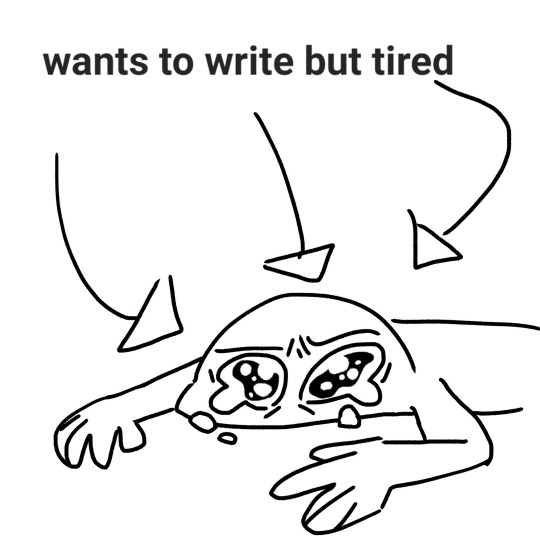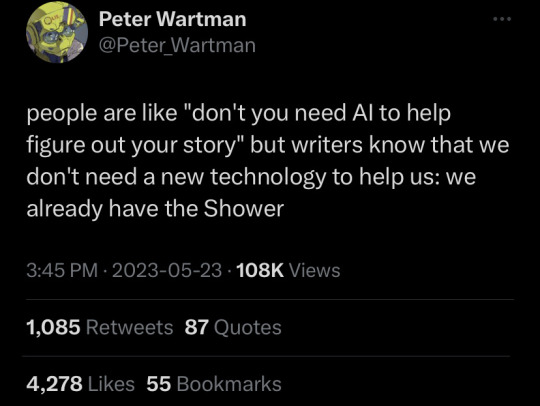Text
Anybody else got that Evergiven sized writers block
167K notes
·
View notes
Text
Person: What's your book about?
Writers:

I'm both somehow 🙃
7K notes
·
View notes
Text
The thing about writing is that until you publish it there is 0 cost to fucking it up. You're not using up materials. You're not doing anything that can't be undone. You can fuck around endlessly to figure out what you want and it's free.
Like, yes, ok, you might waste your time
but would you rather waste your time writing or being too scared to write?
4K notes
·
View notes
Text
Alternatives to google docs
For various reasons, this is now a hot topic. I'm putting my favorites here, please add more in your reblogs. I'm not pointing to Microsoft Word because I hate it.
Local on your computer:
1.

LibreOffice (https://www.libreoffice.org/), Win, Linux, Mac.
Looks like early 2000 Word, works great, imports all formats. Saves in OpenDocumentFormat. Combine with something like Dropbox for Cloud Backup.
2.

FocusWriter (https://gottcode.org/focuswriter/) Win, Linux.
Super customizable to make it look pretty, all toolbars hide to be as non-distracting as possible. Can make typewriter sounds as you type, and you can set daily wordcount goals. Saves in OpenDocumentFormat. Combine with something like Dropbox for Cloud Backup.
3.
Scrivener (https://www.literatureandlatte.com/scrivener/overview) Win, Mac, iOS
The lovechild of so many writers. Too many things to fiddle with for me, but I'm sure someone else can sing its praises. You can put the database folder into a Dropbox folder for cloud saving (but make sure to always close the program before shutting down).
Web-based:
4.
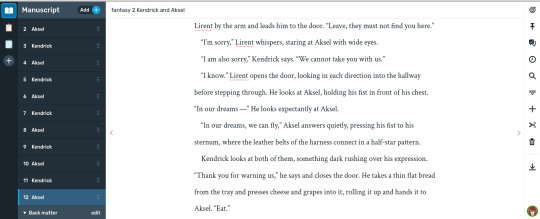
Reedsy bookeditor (https://reedsy.com/write-a-book) Browser based, works on Firefox on Android. Be aware that they also have a TOS that forbids pornography on publicly shared documents.
My current writing program. Just enough features to be helpful, not so many that I start fiddling. Writing is chapter based, exports to docx, epub, pdf. You can share chapters (for beta reading) with other people registered at Reedsy.
5.
Novelpad (https://novelpad.co/) Browser based.
Looks very promising, there's a youtuber with really informative videos about it (https://www.youtube.com/watch?v=mHN8TnwjG1g). I wanted to love it, but the editor didn't work on Firefox on my phone. It might now, but I'm reluctant to switch again.
------
So, this is my list. Please add more suggestions in reblogs.
967 notes
·
View notes
Text
Okay with the caveat that I have not personally verified this, but it does appear to be supported by google support threads and their abuse policy--
User sloan_spencer_author on instagram reports that another author they know had their Google docs access suspended for sharing explicit content.

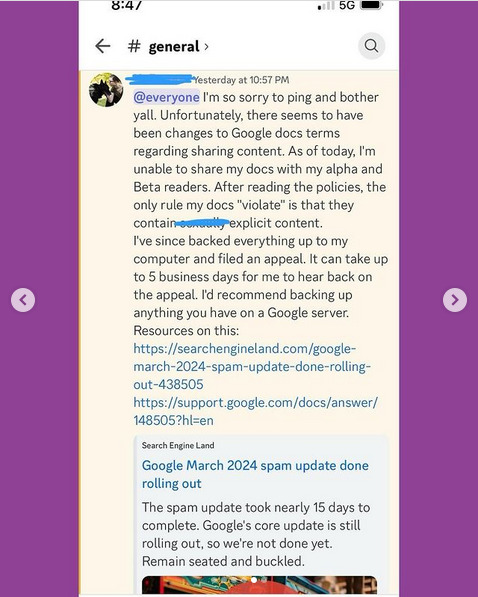
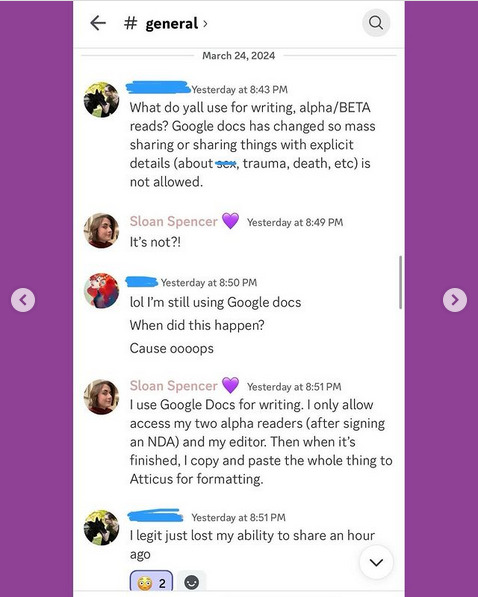
I know that lots of y'all on f1blr use google docs, so I'd encourage you to back up your work locally (on your hard drive/an external drive). I don't know what a good alternative is--I've been using Proton Drive (since I already pay for a Proton email) and I don't see anything in the terms of service about prohibiting explicit content, so. Maybe that and Word or OfficeLibre? Man, I don't know. Our cyberpunk dystopia sucks.
4K notes
·
View notes
Text
[repeating to myself in the mirror] it is fine to write serviceable workaday sentences. not all of them have to be the God-King of Sentences, beautiful in structure, deft in word choice, gilded in metaphor, etc. sometimes a guy has to get from one side of a room to the other.
17K notes
·
View notes
Text
life's too short to write for an imaginary critic that you fear will hate what you wrote
19K notes
·
View notes
Text
When it comes to sex scenes, the rules say things like: Don’t write them at all, and if you do, don’t use these words. Don’t write them silly, porny, dramatic, tragic, pathological, grim, or ridiculous.
My whole practical thesis around the craft of writing a sex scene is this: it is exactly the same as any other scene. Our isolation of sex from other kinds of scenes is not indicative of sex’s difference, but the difference in our relationship to sex. It is our reluctance to name things, the shame we’ve been taught, our fraught compulsion to an act a theatre of types. It is indicative of the lack of imagination that centuries of patriarchy and white supremacy has wrought on us.
To teach sex scenes is to talk about plot, dialogue, pacing, description and characterisation: all those elements that make a captivating scene. A sex scene should advance the story and occur in a chain of causality that springs from your characters’ choices. It should employ sensory detail that concretises and also speaks symbolically to the deeper content of the story. Or if not, it should service your work of art in whatever ways you want from your scenes.
“Mind Fuck: Writing Better Sex” in Body Work by Melissa Febos
11K notes
·
View notes
Text
The best advice really is to just write. Write badly - purple prose, stilted conversations, rambling descriptions. Don't delete it, pass go, take your $200, save all your garbage in a big folder. Look at how much you've made - it doesn't matter if it isn't perfect, isn't polished, it was practice. Every time you write you learn a little more, and find another piece of your voice.
34K notes
·
View notes
Text
Writing wisdom from someone who doesn't feel qualified to give it but can't stop;
Screaming at the document is part of the process. It is always morally correct to berate the manuscript.
The less respect you have for your first draft the easier it is to write--give it a stupid name it'll be fun
Yes, the words hate you. So hate them right back. Assert dominance and make those words work for you.
There are no bad ideas or bad plot threads when drafting--that's revision's problem
When in doubt, note it out
Making faces when writing faces is normal
You're not talking to yourself because you've lost touch with reality, you're just trying to get the character's voice right
Would they say that? Read it out loud to make sure
Nobody says names as often as you're making them. I promise readers will know who it is without you reminding them every other line.
Terms of endearment can be used as often as you want so long as it fits the characters to use them so much
If it sounds weird it reads weird
Protagonist doesn't mean hero, it doesn't even mean nice, it's who the story is following
Antagonist doesn't mean villain, it doesn't even mean mean, it's who is disrupting the protagonist
If it's in character to be an unlikeable little weirdo, embrace it. Don't water your weird brain gremlins down because some hypothetical reader might be offended.
Seriously, read it out loud.
189 notes
·
View notes
Text
A. SHITTY. DRAFT. IS. ALWAYS. BETTER. THAN. NO. DRAFT.
Thank you.
19K notes
·
View notes
Text
Some of my writer’s block cures:
Handwrite. (If you already are, write in a different coloured pen.)
Write outside or at a different location.
Read.
Look up some writing prompts.
Take a break. Do something different. Comeback to it later.
Write something else. (A different WIP, a poem, a quick short story, etc.)
Find inspiring writing music playlists on YouTube. (Themed music, POV playlists, ambient music, etc.)
Do some character or story prompts/questions to get a better idea of who or what you’re writing.
Word sprints. Set a timer and write as much as you can. Not a lot of time to overthink things.
Set your own goals and deadlines.
Write another scene from your WIP. (You don’t have to write in order.) Write a scene you want to write, or the ending. (You can change it or scrap it if it doesn’t fit into your story later.)
Write a scene for your WIP that you will never post/add to your story. A prologue, a different P.O.V., how your characters would react in a situation that’s not in your story, a flashback, etc.
Write down a bunch of ideas. Things that could happen, thing that will never happen, good things, bad things.
Change the weather (in the story of course.)
Feel free to add your own.
13K notes
·
View notes
Text
A Writer's Guide to Character Development
I don’t know about you guys, but I can only answer “what’s your character’s favorite flavor of ice cream” so many times before I realize those lists are not going to help me actually write the character.
So, instead, I like to drabble practice. Answer these ten key questions about your character (answer in character). Then, after you know them a little better, write ten scenes (NOT part of your planned story) with the ten prompts below. Set it in your world, but it can be whenever you want—pre-story, or post-story, or mid-story. You could even write two scenes for one prompt, contrasting where your character starts the story and where they end up, or write one in first person and then write it again in third.
Just has to cover events that are NOT plot points. The point of the exercise is to come up with scenes you can toss out as soon as you finish them. You might end up using some of the lines or scenes you come up with, but for now you’re just playing around.
QUESTIONS
What does your character tell everyone is their greatest fear? What is it actually? Is it the same? Why or why not?
What is their greatest strength and greatest weakness?
Name the most important people to this character. All of them. Family and close friends and lovers.
Does your character have enemies? Who and why?
What is your character’s favorite holiday and why?
How does your character like to present himself/herself? How do they dress? How do they act? Are they friendly or standoffish? Do they like to make a scene, or are they a wallflower?
What is their love language? How do they express it, and how do they best receive it?
What is their highest virtue? What is something that peers would praise about your character? What do they value most in other people?
Are they messy or neat? Why or why not?
If your character could change one thing about their life, what would it be and why? And, conversely, if they could only save one thing from their life, what would it be?
PROMPTS
Your character has had a bad day. What happened?
Your character’s loved one is sick. What do they do?
It’s your character’s birthday.
Someone is hiding something from your character. How do they uncover what it is?
Your character has just heard the news. A character they loved is dead. Describe the rest of their day.
Your character is on their own for dinner.
Your character has the day to himself/herself. No responsibilities, nothing. What do they do?
In the middle of the night, your character hears a noise in the house.
Your character knows they will die at midnight. What is their last day like?
Your character suddenly develops amnesia. Their loved ones try to jog your character’s memories by taking them to familiar locations and reminiscing.
2K notes
·
View notes
Text
You can analyze your favourite writers' techniques. You all know that right?
When you read a book or fic or whatever and are blown away by how amazing the writing is you can just go, "huh, how is the writer doing this? what things are they doing to get this affect?"
And if you can't figure it out you are allowed to google it. Check out YouTube videos, blog posts, and the wealth of posts on Tumblr even. If the writer is famous enough there might even be full-length academic papers on Google Scholar or JSTOR, or even 100+ page published books dissecting their style (Tolkien, for example, if you like his style). If you still can't find the information, ask someone. Ask more experienced writers or writers who write in a similar style. Ask writing advice blogs/channels. Ask the writer/author themselves.
And if you still can't figure it out, you can keep trying things and reading similar stuff, observing until it clicks.
I just say this because, well, reading someone else's writing and feeling like yours is horrible in comparison is pretty much a universal writer experience. I see a lot a posts on Tumblr offering encouragement like, "it is okay if you writing isn't like theirs, you just have different strengths," and "actually your writing is better than you think it is, you've just been staring at it too long." And these are valid.
But also, just because you can't write like that now doesn't mean you can't learn. You don't have to resign yourself to a particular style just because it comes easier to you. It is completely okay to be happy with the style you have, but it is also okay to not be happy with it and wish you could write like your favourite writers instead.
Just... when you get that, "oh my gosh, I will never be as good as them," feeling, maybe try figuring out what it is they are doing that you like so much. Maybe being patient with yourself doesn't mean accepting that this is your best work. Maybe it means accepting that this isn't and that it will take time, knowledge, and practice to get there. But you will, you just have to keep trying.
3K notes
·
View notes
Text
Treating mental illness in fantasy settings
CW: self harm mention
I recently received an ask that included the phrase “[it’s a] fantasy-type setting, so there isn’t really any medication for treatment [for mental illness].” This is absolutely one of my worst pet peeves when writing about mental illness.
By saying “there’s no treatment for mental illnesses” simply because of the setting, you miss a huge opportunity for imaginative and creative world-building.
Let’s look at a tangentially related example from one of my favorite authors.
Years ago, I remember reading one of @tamorapierce ‘s books (I forget exactly which book it was), and a single tiny detail really left a lasting impression on me.
The female main character was able to obtain an enchanted charm to prevent pregnancy.
Honestly, that blew my fucking mind. Despite being an avid reader of fantasy, I’d never seen magic used in that way. It seems like birth control is such a modern invention, but this charm was integrated so seamlessly into the world that it just felt right. It was such a clever, creative detail that in retrospect makes perfect sense.
So back to my point: if magic can recreate (or even surpass) the effects of modern medicine to treat physical problems, there’s no reason you can’t also creatively apply it to treat mental illnesses.
Does your setting have potions? Then you can make a potion of euthymia to treat depression.
Does your setting have enchanted objects? Then you can have a bracelet of grounding to ward off dissociation and flashbacks.
Does your setting have spells that can affect people’s minds? Then you can have a mood stabilizing spell to treat bipolar disorder.
Dungeons and Dragons already has spells and objects that let you see through things that aren’t actually there! That’d be really helpful to a character who has visual hallucinations.
Also, St. John’s Wort (which is a naturally growing herb) has been used as an antidepressant since medieval times. See my post about it here.
I collaborated with the Scriptshrink consultants to come up some more examples:
Hypnosis-like magic could help characters work through mental blocks in therapy, through unraveling the thought patterns that lead up to destructive loops, or dissecting the elements of a panic attack to sort of unpack it and make it more manageable. (Elizafaraday)
A spell or charm to see through the eyes of others could help with body dysmorphia and social anxiety, or that could give a visual or audio cue as to how others perceive the character (ex not even noticing-favorable-neutral-unfavorable) (Elizafaraday, Anon32)
Magic items like bracelets that can provide any sensory input desired when touched to allow different stims. (Anon32)
Magic spells or elixirs than can block stimuli when over stimulated. (Anon32)
A magic ring that could treat self-harm, trichotillomania, or excoriation disorder by making the wearer’s skin unbreakable and their hair impossible to pull out. Alternately, it could give the illusion that the wearer has already done that activity (including all the neurochemical stuff that implies), without actually having themselves come to harm. (Anon32)
If you decide to go with the idea that schizophrenia is caused by spirits / possession, there could be a spirit repelling potion or wards to prevent it. (barc0de)
I would also recommend that these treatments have some kind of drawback, so they don’t end up falling into the “perfect instant magical cure” trope.
Spells may wear off with time, or can only be cast by certain people. They may also have side effects if cast constantly (headaches, dizziness, etc.)
Potions can be expensive or require gathering certain rare ingredients. They could also have side effects.
Maybe the enchanted item is fragile, and could break if directly hit while its wearer is in combat (for maximum drama).
Also, feel free to hit up @scriptwitchcraft for ideas on potion crafting and stuff in a magical setting!
Disclaimer - The Shrink would like to emphasize that this is advice meant to apply to writing fantasy settings only. Do not apply this post to treat mental illness in real life.
4K notes
·
View notes
